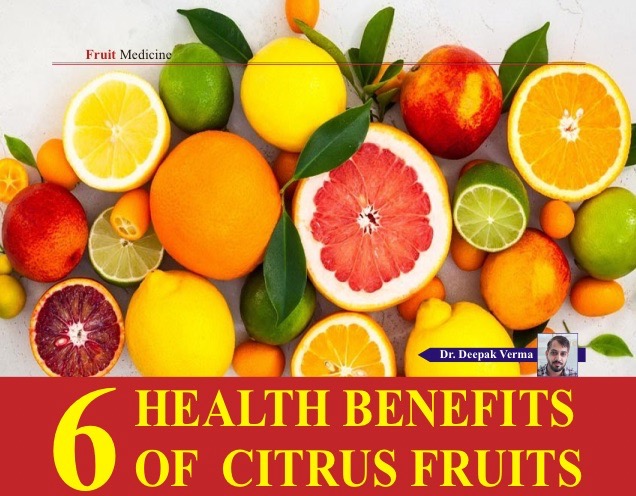Citrus fruits are among the most popular fruits in the world. They represent an important part of our diet because of their high nutrition values.
Citrus fruits include many types of fruits, such as lemon, lime, grapefruit, and several types of oranges. Fruits in the citrus family grow on evergreen trees or shrubs. They have fairly thick skin and pulpy flesh that is divided into segments. Citrus fruits have long been valued as part of a nutritious and tasty diet. The flavors provided by citrus are among the most preferred in the world. It is well established that citrus fruits are a rich source of vitamins, minerals and dietary fiber that are essential for normal growth and development and overall nutritional well-being.
Like most other whole foods, citrus fruits also contain an impressive list of essential nutrients including both carbohydrate (sugars and fibre), potassium, folate, calcium, thiamine, niacin, vitamin B6, phosphorus, magnesium, copper, riboflavin, pantothenic acid and a variety of phytochemicals. In addition, citrus contains no fat or sodium and being a plant food, no cholesterol. The main energy-yielding nutrient in citrus is carbohydrate in the form of sugar viz fructose, glucose and sucrose, as well as citric acid which can also provide a small amount of energy.
Citrus fruits are notably rich in vitamin C. This vitamin is needed to form and maintain healthy skin, bones, blood vessels and connective tissue. It plays an important role in supporting the immune system and also acts as an antioxidant that might help protect cells against the effects of free radicals and reduce inflammation. It is very useful in preventing heart diseases, kidney diseases, joint disorders and certain types of cancers.
It also helps to boost immune system. Vitamin C helps the body to absorb iron from plant foods.
Potassium is an essential mineral present in citrus fruit which is used to maintain fluid and electrolyte balance in the body. Deficiency in potassium causes fatigue, irritability, and high blood pressure. Citrus Fruits high in potassium include kiwi fruit, pomegranate and oranges. These also help to maintain potassium levels in dehydrated conditions like chronic sweating, diarrhea and vomiting.
Citrus fruits also contain non-starch polysaccharides, commonly known as dietary fibre, which is a complex carbohydrate with important health benefits. The predominant type of fibre in citrus is pectin, making up 65 to 70 percent of the total fibre. The remaining fibre is in the form of cellulose, hemicellulose and trace amount of gums. Citrus also contains lignin, a fibre-like component. In the body, dietary fibre holds water-soluble nutrients in a gel matrix which delays gastric emptying and slows digestion and absorption. It helps to prevent a surge in blood glucose levels and regulates body weight.
HEALTH BENEFITS
1. Immunity
The essential vitamins, minerals and photochemicals present in citrus fruits encourage the immune system to protect the body from foreign invaders.
2. Cholesterol and Blood Pressure
Flavonoids in citrus fruits prevent against atherosclerosis and heart disease by scavenging free radicals, inhibit low-density lipoprotein – “bad” cholesterol (LDL) oxidation and reducing oxidative stress and inflammation by improving endothelial function and arterial blood pressure.
Kokum Fruit and grape fruit help in improving cholesterol levels, thus can have a positive impact on high blood pressure and overall heart health.
3. Fight Wrinkles
Citrus fruits have many essential nutrients for the production of collagen, one of the most common proteins in the body which provide support for the skin. A single lemon has about half the recommended daily allowance of vitamin C, while an orange has more than 100%. Eating more vitamin C may help improve skin health and reduce skin aging.
4. Improves Haemoglobin
Consuming citrus fruits rich in vitamin C can help prevent anaemia and its devastating consequences. Vitamin C can increase the absorption of non-haem iron (the inorganic iron form found in plant foods). The bioavailability of non-haem iron is much lower than that of haem iron, which is found in foods of animal origin. Vegetarians and individuals who consume little meat and animal products are at an increased risk of iron-deficiency, which can lead to anaemia over time. The citrus fruits help in the maturation of red blood cells, which ultimately prevents anaemia.
5. Digestion
Citrus flavonoids have the ability to modulate gut bacteria composition. This effect contributes to improve gastric functioning. Pomegranate, Grapes and Gooseberry are best to elevate the digestion process and increase hunger.
6. Kidney Care
Eating and drinking of citrus fruits may help prevent kidney stones by increasing urinary citrate. Increasing their consumption in daily diet is recommended for individuals at risk of certain kinds of kidney stones. Citrus fruits like amla and big lemon fruit have antioxidant activity and thus are beneficial for the prevention of age-related renal diseases.
Citrus fruits are among the most popular fruits in the world. They represent an important part of our diet because of their high nutritional values and health benefits. Their consumption on daily basis reduces the risk of heart diseases, skin disorders, urinary disorders and many types of cancer.
Assistant Professor,
PG Department of Dravyaguna Vigyan,
Dayanand Ayurvedic College, Jalandhar (Pb.)
Mob.:9166034100







 Dec 2024
Dec 2024
 May 2024
May 2024
 September 2022
September 2022
 April 2022
April 2022
 October 2020
October 2020
 Jan 2020
Jan 2020
 June 2019
June 2019
 January-February 2019
January-February 2019
 Augest-September
Augest-September
 April 2018
April 2018
 November 2017
November 2017
 June 2017
June 2017
 November 2016
November 2016
 September 2015
September 2015
 March 2015
March 2015
 July 2014
July 2014
 January 2014
January 2014
 July2013
July2013
 March 2013
March 2013
 May 2012
May 2012
 May 2011
May 2011
 Sep 2010
Sep 2010
 Jun 2010
Jun 2010
 Feb 2010
Feb 2010
 December 2009
December 2009
 August 2009
August 2009
 June 2009
June 2009
 Feb 2009
Feb 2009
 December 2008
December 2008
 October 2008
October 2008
 March 2008
March 2008
 July 2008
July 2008
 May 2008
May 2008